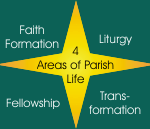

 |
|
 |
|
Homily for July 24th, 2005.
Caution: Putting a Sunday homily on the Website is tricky business. All the viewer has is a written text. A homily, on the other hand, is "an oral event". It may not have been said or heard the way it was written. In addition, a roughly ten-minute homily is part of a roughly one-hour worship event in which God and God's people communicate with each other by means of ritual, symbol, song, proclamation, prayer. Not everything in these homilies is original. As a homilist, I rely on and at times borrow from other homilists and writers who are not properly mentioned in this format. I am often indebted to them. Father William Marrevee, s.c.j.
17th Sunday Ordinary Time A I wonder how we sang the refrain of today’s psalm “Lord, I love your commands”? Not musically, but what that line triggers in us. How do we speak with delight, with joy about God’s laws and commandments? Loving God’s commands? Are not laws restrictive of our freedom, burdensome, a nuisance? And yet, we sang “Lord, I love your commands”. Is that not strange? Is that the sort of line that is nice to use in church, but don’t let it interfere with what we do outside this place? Or is it one more indication that what we are about here is out of touch with the real world? Look at some of the verses of that same psalm: “The law of your mouth is better to me than thousands of gold and silver pieces.” “Truly I love your commandments more than gold, more than fine gold.” Really? And this is only a snippet from psalm 119, the longest of all psalms; 176 verses, almost 6 pages in my Bible. It is all about God’s law, using no less than eight synonyms for it: teachings, decrees, precepts, laws, commands, edicts, words, promises. Nowhere is there a hint that God’s law is restrictive of freedom or burdensome. On the contrary, observance of God’s law is a source of light, of life, of joy, of delight. How can this be? For one thing: God’s law is not a set of rules that God arbitrarily throws at us to keep us in our place. Nor is the law some sort of bargaining tool; “Obey the law and you will earn God’s favour.” That would be blackmail. We have God’s favour undeservedly. The one who put the psalm together is one who, in the Bible, would be described as a friend of God, in tune with God. Indeed, his meditation on the law comes from a profound communion with God. In that relationship with God the psalmist knows the law as a mode of God’s life-giving presence to us. The law has its source in God’s tender care and love for us as God’s beloved people. God’s law, God’s commands give those who observe them space in which to be fully human. People who trust in God and who yield to God will observe the commandments, will be obedient to God’s law not out of fear, not to score points or to gain a reward in the end, but they know that this is the way to true life. This is the way one lives in God’s kind of world. Absorbing God’s law, letting oneself be permeated by it, dwelling in its ambit accounts for life in all its fullness. Being able to appreciate God’s law that way, being able to live by it is the wisdom Solomon was seeking (first reading), it is finding a hidden treasure or finding a pearl of great value (Gospel reading). It is like an acquired taste for good wine. That is why we would want to pray for such an acquired taste for God’s law that enables us to say indeed that we love God’s law more than anything. It is real wisdom, a real treasure. |
|||||
| © Copyright 2025 Our Lady of Victory / St-Malachy Site
490 Charles Street • Gatineau • Quebec • J8L 2K5 Telephone: (819) 986-3763 Website powered by Arvixe Web Hosting |